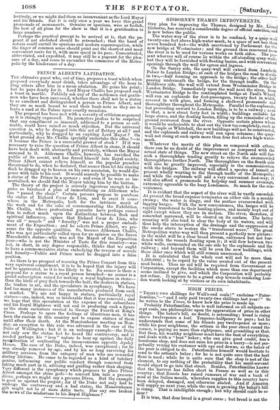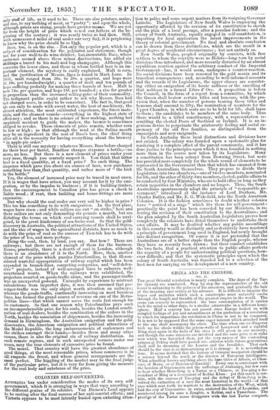HIGH PRICES.
" LUSTY-TWO shillings for Wall's-end coals !" exclaims " Pater- familias,"—" and I only paid twenty-two shillings last year !" So he writes to the Times, to know how the price is made up. Probably Paterfamilias, who is well informed on all subjects ex- cept coals, can philosophize upon the aggravation of price in other things. The baker's bill, no doubt, is astounding; bread is rising above twelvepence a loaf. Tenpence-halfpenny he pays ; but he understands that some of his friends pay twelvepence or more; while his poor neighbour, the artisan in the poor street round the corner, is paying no more than eightpence, and grumbling at that. But then, his wealthy neighbour must have the best of everything, and deals with a " best" baker; who can give good credit, has a handsome shop, and does not raise his price in a hurry—is not per- petually vexing his customer with ups and downs, as the baker of the poor is obliged to do. Paterfamilias himself would hesitate to send to the artisan's baker ; for he is not quite sure that the best flour is used ; while he is quite sure that the shop is not of the cleanest, to say nothino.° of the probability that his maid-servant would object to go into that street. Besides, Paterfamilias knows that the harvest has fallen short in France as well as• in this country ; that Russia has raised rumours of war and a bank of mud at the Salina mouth, wherefore supplies to this country have been delayed, damaged, and otherwise abated. And if .4nierica will supply us next year, while the corn is growing thebefic,e„f's is rising. That is intelligible enough ; but why should. cogs be so dear ?
It is true, that dear bread is "a great curse ; but bread is not the only staff of life, as it used to be. There are also potatoes, maize, and rice, to sayinothing of meat, or "pastry "; and upon the whole, although prices are rising, people have greater means. We are yet far from the height of price which vexed ouejathers at the be- ginning of the century ; it was nearly twice as bad then. Still, with unmeasured miles of coal under our very fqet, it is perplexing to know why the price should be so high. Beer, too, is on the rise. - Nott.only thR popular pot, which is a subject of consideration for the, politieitui and statesman, though not for your well-to-do wine-drinker, butimmutable Bass, whose eminence seemed above these minor fluctuations, has added six Ekillings a barrel to his malt-and-he nhanipa one. Although this concerns the lower class, and those to whom bottled beer is an im- portant lelement, the mystery is easily explained. Malt is corn, and the justification of Messrs..Bffssis found in Mark Lane. In 1851, malt ranged from 56s. to Os. a quarter, and hops were 51. 108. per hundredweight; a quarter of malt and ten pounds of hops sufficing probably for making three barrels of beer. Malt is now 74s. per quarter, and hops 181. per hundred ; a rise far greater in proportion than the increased selling-price of their commodity. The indignant public ought rather to ask why Messrs. Bass had not charged more, in order to be consistent. The fact is, that good ale can only be made with sweet water, the best of machinery, the closest attention, the most cultivated experience, the finest mate- rials, and the cleanest vessels—everything in the highest state of efficiency ; and as there is no science of beer-making, nothing but empirical accident to guide the maker, the brewer is sometimes obliged to revoke. These elements of price remain, whether corn be low or high ; so that although the mud at the Salina mouth may be an ingredient in the cost of Bass's beer, the chief thing after all is the necessity for having everything about the brewery " in apple-pie order."
There is still one mystery : whatever Messrs. Bass before charged for their beer per barrel, Boniface charges sixpence a bottle,—no more, no less. But there is a new element of prices under your very nose, though you scarcely suspect it. You think that bitter beer is a fixed quantity, at a fixed price ? No such thing. The sixpence which gave you about six ounces of beer, now purchases something less thanthat quantity, and rather more of " the kick in the bottle."
Yes, the element of increased price may be traced in most cases. If it is wages that have arisen, you may account for it by the emi- gration, or by the impulse to business ; if it is building-timber, then the encouragement to Canadian pine has given a check tO Baltic wood ; if rent, then building and house-fittings are more expensive.
But why should the coal under our very soil be higher in price ? This too has something to do with emigration. In the first place, wages have risen ; and while colliers are out " on strike," here and there sailors are not only demanding six pounds a month, but are dictating the terms on which coal-carrying vessels shall be navi- gated, to the great hinderance of sea-borne coal. So that the gold- discovery inAnstralia, the political attractions of the United States, and the rise of wages in the agricultural districts, have as much to do with the price of coal as the success of Tien-teh has to do with theirice of tea, and more perhaps. Bring the coal, then, by land, you say. But how? There are railways ; but there are not enough of them for the business. Henee, practically, there is a dearth of coal in London, although there is an abundance of it in the North. Here, then, another element of the price which puzzles Paterfamilias, is that ill-con- sidered wasteful appropriation of railway capital which has been expended in branch-lines, competing companies, and " self-defen- sive " projects, instead of well-arranged lines to subserve well- ascertained wants. When the railways were established, the projectors counted on goods-traffic alone, and the passenger-traffic was an unexpected godsend. Untaught by experience to mistrust calculations from imperfect data, it was then assumed that pas- senger-traffic was the only object worth attention on railways ; whereas the goods-traffic, continually increasing on most business lines, has formed the grand source of revenue on one of the Metro- politan lines—that which cannot serve the coals fast enough for its customers. So that one reason why Paterfamilias pays such an incomprehensible price for his coals, besides the London combi- nation of coal-dealers, besides the combination of the sailors in the North, bfsides the association of shipowners, besides the increasing demand in Birmingham, the Australian emigration and the gold- discoveries, the American emigration and political attractions of the Model kepublic, the long embarrassments of coalowners and the strikes amongst their hands,—besides these and many other causes, there is also the original sin of railway distribution. In such remote regions, and in such unexpected corners under our noses, may the true elements of excessive price be found.
The moraL That country will have the greatest abundance of good things, at the most reasonable prices, whose commerce is in all:Plapects the freest, and whose general arrangements are the most perfect. The higgling of the market may be the final judge of the particular price, but it is very far from giving the measure for the real body and substance of the price.



































 Previous page
Previous page